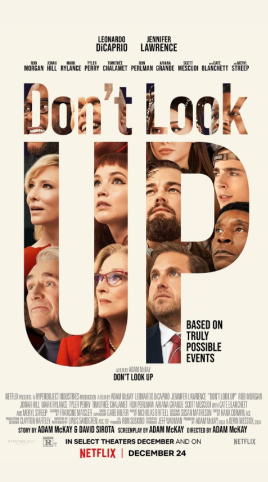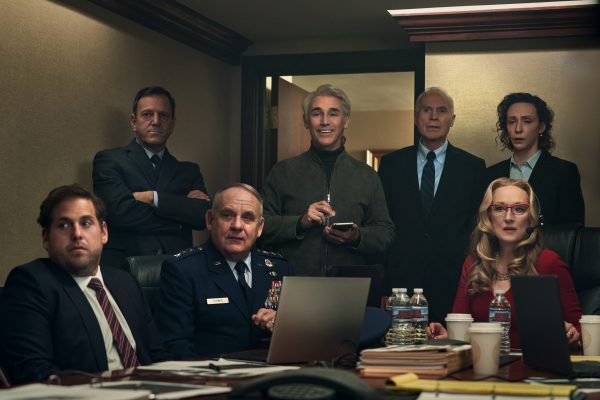
“Don’t Look Up” (2021). Cast: Leonardo DiCaprio, Jennifer Lawrence, Meryl Streep, Cate Blanchett, Rob Morgan, Jonah Hill, Mark Rylance, Tyler Perry, Timothée Chalamet, Ron Perlman, Ariana Grande, Scott Mescudi, Himesh Patel, Melanie Lynskey, Michael Chiklis, Paul Guilfoyle, Robert Joy. Director: Adam McKay. Screenplay: Adam McKay. Story: David Sirota. Web site. Trailer.
When faced with difficult situations, it may be tempting to turn a blind eye, willingly choosing to remain oblivious and ignorant. By tuning out and wallowing in our own complacency, we have an opportunity to lull ourselves into distraction and denial, hoping that the wishful thinking spawned from such practices will somehow materialize into a bona fide reality. But what do we do when we realize that’s not going to happen, when we understand that we’ve squandered opportunities to solve the issues facing us? Such are the challenges faced in the new darkly satirical comedy, “Don’t Look Up.”
Making a grand astronomical discovery should be a distinguished feather in one’s cap. Being the first to spot something previously unknown is quite an accomplishment. Indeed, it truly should be a cause for celebration.
Ordinarily, that is.
For Ph.D. candidate Kate Dibiasky (Jennifer Lawrence), discovering a previously unknown comet is a landmark event, one that, according to standard practice, gets her name associated with the celestial body. However, when her professorial colleague Dr. Randall Mindy (Leonardo DiCaprio) charts the trajectory of the new find, he learns that the enormous astral body is headed straight for an impact with Earth in six months’ time, one that’s sure to be a planet killer. So now what?
In an effort to get the ball rolling toward implementing a possible solution, Kate and Randall contact NASA colleague Dr. Teddy Oglethorpe (Rob Bowman). Together they plan a presentation for President Janie Orlean (Meryl Streep), an expediency-driven politico who’s more concerned with her image and agenda than with commonsense practicality, no matter how potentially problematic such decisions might be. She’s concerned that the trio of scientists is overdramatizing the situation, essentially that they’re proposing the needless spread of rampant unwarranted fear if the finding were to be made public. The often-oblivious Commander in Chief, an ingeniously concocted cross between Donald Trump and Hillary Clinton, suggests that everyone sit tight and assess the circumstances until further evidence is collected. The President’s woefully inappropriate response, backed by her equally clueless yes-man Chief of Staff, Jason (Jonah Hill), the nation’s First Son, leaves the astronomers (especially the unabashedly outspoken Ms. Dibiasky) perplexed and reeling. It comes across as the ultimate WTF. Indeed, with the clock ticking, there’s no time to waste.

Nevertheless, upon further study by government scientists, it soon becomes apparent that the conclusions reached by Kate, Randall and Teddy are correct and that authorities need to take action to address the impending crisis. But, true to form, President Orlean insists on managing matters in a properly finessed way to put the right spin on this dire revelation.
Kate and Randall, for instance, are urged to make a number of media appearances on popular TV shows to present their information, but in a carefully massaged form so as to soften the blow to a public that could easily lose control over this “unpleasant” news. To that end, it’s even suggested that they pursue “media training” to hone their presentation skills, such as in preparation for their appearance on The Daily Rip, a morning talk show that glibly aspires to be a cutting-edge news, political and entertainment vehicle anchored by obviously dim-witted happy talk hosts Jack Bremmer (Tyler Perry) and Brie Evantree (Cate Blanchett). And, even though their initial appearance doesn’t quite go as smoothly as planned, Randall quickly becomes a whizz at media work for explaining the situation in suitably appropriate audience-specific parlance, such as when he does a guest spot on a children’s program with colorful puppets a la Sesame Street.
But carefully orchestrated media appearances are only part of the President’s plan. She opts for an ambitious mission employing a recommissioned Space Shuttle that’s intended to use weapons for smashing the massive comet into smaller, more easily manageable chunks. And, in line with that, the Pres seeks a hero to serve as a shining symbol of this valiant attempt to save the planet. To lead the mission, she names former astronaut Col. Benedict Drask (Ron Perlman), a prototypical bygone era man’s man with a penchant for making public statements peppered with political incorrectness. While he may not be astutely savvy, he’s the most experienced pilot for the job and is hell-bent on keeping Armageddon at bay by taking down the son-of-a-bitch astronomical monstrosity.

Of course, President Orlean knows all too well where her bread is buttered, and so she readily seeks to accommodate generous campaign donors who want to become involved in this global rescue effort. Such is the treatment accorded Peter Isherwell (Mark Rylance), the enigmatic head of The Bash Corporation, an electronics and technology giant, whose super-cool guru demeanor bears more than a striking resemblance to that of the late chairman of a certain fruit-inspired enterprise. Isherwell has a vested interest in how the rescue mission unfolds and seeks to wield his considerable monetary influence to see that it turns out to his liking. And so, in yet another typical act of political expediency, POTUS looks to accommodate her benefactor by complying with his wishes, a move that complicates the worsening situation in ways that absolutely, positively defy reason.
Even though it appears that efforts are being made to rectify matters, it’s obvious by now that the patients are indeed running the asylum, a fitting metaphor if there ever were one. As events continue to spiral out of control and grow ever more absurd by the moment, the comet continues its relentless journey toward Earth. With time potentially running out, will humanity wake up and do what’s necessary to save the planet in time? Or will we fall victim to our own self-serving desires, short-term thinking and pervasive ineptitude? What’s more, will there be enough time for us to make amends with our personal circumstances and make peace with ourselves? Stay tuned.
If we were faced with comparable circumstances, what should we do? After all, with the prevalence of Near Earth Objects like comets and asteroids making close passes to the Earth, this frightening possibility might not be so far-fetched. So, given the potential consequences of something like this, we had better focus on getting our priorities straight. But will we?
In light of where we seem to be placing many of our priorities these days, it would appear that we’re putting too much emphasis on petty, ancillary, often-irrelevant concerns and not nearly enough attention on what really matters. And, in many ways, this film is a fitting metaphor for this fundamental problem. Whether we’re talking literally about an annihilating astral body impact or figuratively about any number of issues like environmental degradation, social polarization or economic inequality, they’re all potentially devastating catastrophes – and far more important than wondering what’s topping the pop charts and who their performers are sleeping with.

“Don’t Look Up” is a potent cautionary tale where this is concerned. And it doesn’t mince words when it comes to making this point. Director Adam McKay’s latest is intended to get us to pay attention to what matters by giving us all a big slap in the face, one that we, in our collective ignorance, genuinely need and deserve. After all, we brought on circumstances like these ourselves – and we’re the only ones who’ll be able to get ourselves out of it. That’s provided, of course, that we’re paying attention.
So how do we extract ourselves from situations like this? It depends heavily on our thoughts, beliefs and intents, for they have direct impact on the reality we manifest through the conscious creation process, the philosophy that maintains we draw upon these resources in manifesting the existence we experience. And, in this case, it has much to do with the beliefs we hold regarding the priorities we set for ourselves.
If Earth were facing the possibility of being struck by a planet-killing comet, what do you think the priorities should be? Well, anyone with some common sense, backed by beliefs supporting that, would probably begin looking for ways to forestall that inevitability, perhaps considering ways to break up the object into smaller components or deflect it so that it misses us. And, given the magnitude of the circumstances, it seems only logical that these efforts should be launched with all deliberate speed and concerted effort. However, the question once again rises, will we?
Considering our pervasive penchant for immersing ourselves in distractions and denial, it’s truly conceivable, as this story illustrates, that we might well turn our attention away from pressing concerns in favor of ridiculously trivial matters. After all, we seem to be doing this with many of the major issues facing us that were noted previously – environmental degradation, social polarization or economic inequality, to name just a few. It’s a seductive force, one that even manages to pull in those who start out genuinely concerned but get taken by the allure of the limelight, as seen by Dr. Mindy’s growing acceptance of his own stellar media presence. But, ultimately, focusing on who’s hot on social media won’t matter a damn if we’re being inundated by unstoppable mile-high tsunamis.

Even the film’s title plays into this. Characters like President Orlean discourage people from looking up to see the approaching comet when it begins coming into visual range. Instead, they urge everyday citizens to keep their heads buried in their cell phones, riveted by poorly lit photos of what their cousins had for dinner than paying attention to what’s important. Anyone with any sense of reason can’t help but wonder what’s behind such mindless madness.
This calls for us to take off the blinders and set aside tunnel vision, reordering what deserves our attention and discarding what’s immaterial. It also means getting real about things and shedding feelings that we’re being personally attacked for not placing proper emphasis on the priorities that matter most. And, to a great degree, this is why this film has not set well with many viewers – because it’s hitting too close to home. To me, however, that suggests that glimmers of this picture’s message just might be getting through – and, one would hope, before it’s too late to deal with some of the growing problems we’re dealing – or not dealing – with.
In addition to working on ordering priorities, circumstances like these encourage us to adopt new mindsets. For example, they urge us to think outside the box, to devise creative solutions to existing challenges, initiatives that seek to overcome limitations and obstacles in arriving at workable answers. They also encourage us to work together, forging collective solutions through concentrated efforts of effective co-creation. These are both admirable goals in even the most mundane manifestation efforts, but, when our backs are up against the wall, they become positively essential if we hope to resolve the troubling scenarios we face.
In all these ways, “Don’t Look Up” could be seen as a more than a movie. Indeed, it could be seen as a critical wake-up call to a sleeping society. And, if it has to shout to get that message across, then so be it. Trying to get the public’s attention with messages of lesser degrees of urgency obviously hasn’t worked, so maybe it takes a splash of ice water like this to have an impact – and one that’s ultimately nowhere near as devastating as the kind that can come from an incoming comet.

I can’t help but think that the detractors of this picture – especially naysaying critics – doth protest too much when it comes to their ill-conceived complaints about this brilliant satire, primarily because the film’s criticisms hit far too close to home for the self-absorbed, supercilious elite in business, politics, and, especially, the media, the institution charged with reviewing material like this. This bitingly cynical yet consistently hilarious dark comedy about the inadequate responses of various corners of officialdom poignantly illustrates the wrong-headed emphasis that contemporary authorities place on self-serving expediency rather than genuine leadership in the face of certain doom. As a metaphor for the current state of American culture, the film is undeniably more than a little over the top, but, given the nature of the message, it also couldn’t have been anything less in order to make its point, especially to a society that has become increasingly ignorant and complacent to pay attention to what’s really going on around it. The stellar cast is superb across the board, playing their parts near perfectly for each and every character. But what’s most impressive is how genuinely funny this offering is throughout, never succumbing to lulls, pacing issues or jokes that fail to land, something few comedies can successfully pull off these days. Indeed, in a year that has been characterized by a wealth of lame releases that have been undeservedly touted for their alleged brilliance, it’s truly refreshing to see one that finally lives up to such qualities – even if many of those writing about it can’t see that for themselves, about which all I can say is, “I rest my case.” The film is currently streaming on Netflix.
Despite many of the criticisms leveled against this release, the picture has already earned a number of accolades, with more likely to follow. “Don’t Look Up” has been named one of the top movies of the year by both the National Board of Review and the American Film Institute. In addition, it picked up six nominations in the Critics Choice Award competition, including best picture, best ensemble cast, best comedy, best original screenplay, best original score and best original song. Four more nominations have come out of the Golden Globe Award contest, including best comedy picture, best comedy actor (DiCaprio), best comedy actress (Lawrence) and best screenplay.
Sounding the alarm may not be something we enjoy hearing. It can be shrill, irritating and annoying. But, when the house is on fire, we had better be thankful that someone thought up the idea of creating that alarm in the first place. Heeding its warning just might save our lives. But, if we find it obnoxious, bothersome or even insulting, we can always turn a deaf ear and hope that such willful ignorance is enough to get us by. It’s a risk, to be sure, one that easily might not pay off – and who would be sorry then?
Copyright © 2021-2022, by Brent Marchant. All rights reserved.

No comments:
Post a Comment